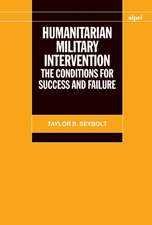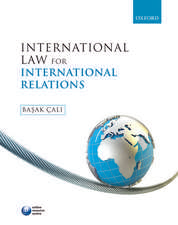The Assault on International Law
Autor Jens David Ohlinen Limba Engleză Hardback – 19 feb 2015
Preț: 218.16 lei
Preț vechi: 264.00 lei
-17% Nou
Puncte Express: 327
Preț estimativ în valută:
41.75€ • 45.33$ • 35.07£
41.75€ • 45.33$ • 35.07£
Carte tipărită la comandă
Livrare economică 11-17 aprilie
Preluare comenzi: 021 569.72.76
Specificații
ISBN-13: 9780199987405
ISBN-10: 0199987408
Pagini: 304
Dimensiuni: 236 x 155 x 31 mm
Greutate: 0.52 kg
Editura: Oxford University Press
Colecția OUP USA
Locul publicării:New York, United States
ISBN-10: 0199987408
Pagini: 304
Dimensiuni: 236 x 155 x 31 mm
Greutate: 0.52 kg
Editura: Oxford University Press
Colecția OUP USA
Locul publicării:New York, United States
Recenzii
Reading The Assault on International Law provides a dramatic insight into the legal, academic, and ultimately - political battles over the place of international law in US domestic law and the US conceptualization of sovereignty. For those with a particular fondness for international law, it reads like a thriller - a pretty good one, for that matter.
The Assault on International Law makes an important contribution to the theory of international law and offers a powerful rebuttal of the sceptical views articulated by a number of American scholars in the last 15-20 years.
A cogently argued and provocative thesis: that the devaluing of international law over the past two decades by a few U.S. law professors, rather than an interesting ivory tower exercise, is directly responsible for some of America's darkest deeds since 9/11.
The single most important question in international legal theory today is: are states bound by international law? The right wing 'neo-cons' say no. Jens David Ohlin takes their favorite weapon-rational choice theory-and turns it on them, to great effect. Along the way, he shares his views about the colorful personalities who operate behind the scenes and the prestigious law schools that they inhabit. The Assault on International Law is one book that people on both sides of the dispute must read and deal with.
Are states capable of functioning as agents? And does their presumptive rationality allow them to make commitments that they can be expected to honor, even when that is not to their immediate advantage? The Assault on International Law documents and challenges a new wave of theory that would put the very possibility of a robust regime of international law in question. The debate about these issues ought to occupy center stage in the theory of international relations, and this book ought to be cast in a leading role.
International law,' Jens Ohlin writes, 'is under attack in this country.' And so it is. But Ohlin's riposte in The Assault on International Law is learned, forceful, and profoundly convincing. I can only hope this critically important book receives the attention it deserves, both within and without the academy; if it does, international law should have little trouble surviving the worst its American critics can throw at it.
The Assault on International Law makes an important contribution to the theory of international law and offers a powerful rebuttal of the sceptical views articulated by a number of American scholars in the last 15-20 years.
A cogently argued and provocative thesis: that the devaluing of international law over the past two decades by a few U.S. law professors, rather than an interesting ivory tower exercise, is directly responsible for some of America's darkest deeds since 9/11.
The single most important question in international legal theory today is: are states bound by international law? The right wing 'neo-cons' say no. Jens David Ohlin takes their favorite weapon-rational choice theory-and turns it on them, to great effect. Along the way, he shares his views about the colorful personalities who operate behind the scenes and the prestigious law schools that they inhabit. The Assault on International Law is one book that people on both sides of the dispute must read and deal with.
Are states capable of functioning as agents? And does their presumptive rationality allow them to make commitments that they can be expected to honor, even when that is not to their immediate advantage? The Assault on International Law documents and challenges a new wave of theory that would put the very possibility of a robust regime of international law in question. The debate about these issues ought to occupy center stage in the theory of international relations, and this book ought to be cast in a leading role.
International law,' Jens Ohlin writes, 'is under attack in this country.' And so it is. But Ohlin's riposte in The Assault on International Law is learned, forceful, and profoundly convincing. I can only hope this critically important book receives the attention it deserves, both within and without the academy; if it does, international law should have little trouble surviving the worst its American critics can throw at it.
Notă biografică
Associate Professor of Law, Cornell Law School; co-author of Defending Humanity (OUP) and co-editor of Targeted Killings (OUP)













